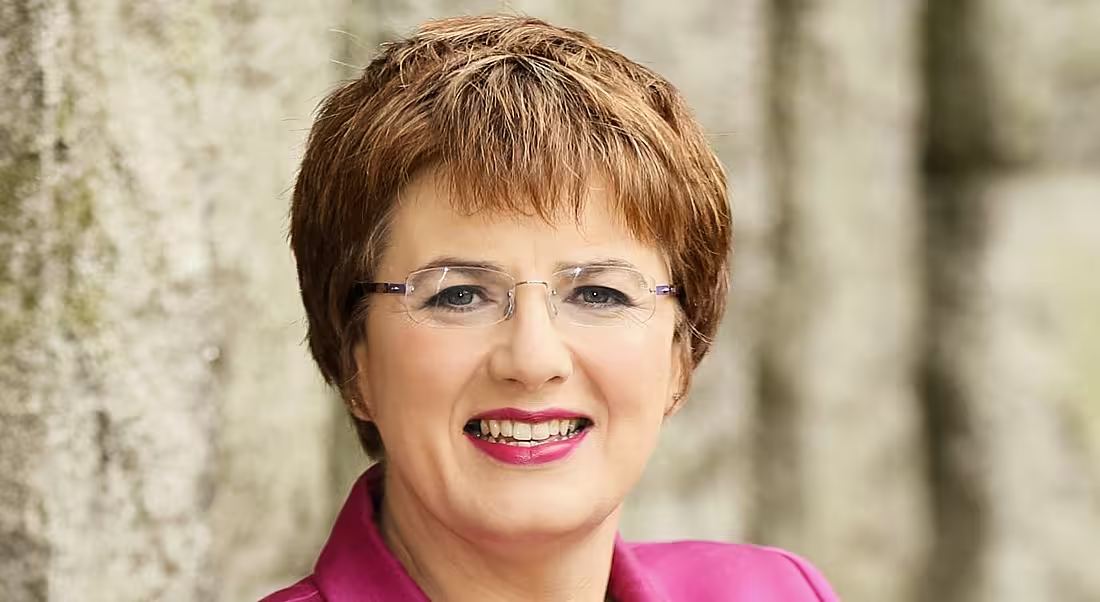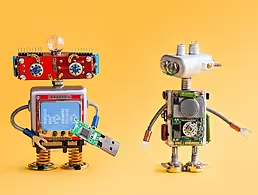Technology is an intrinsic part of our lives, both personally and professionally. How will the advent of tech affect the future of work?
As technological advancement becomes more rapid and more nuanced, we’re beginning to see more and more ways for it to play a part in shaping the future of work.
From machine learning to AI and robotics, the very fabric of the workforce and the workplace may be on the cusp of a dramatic change.
Food and facilities management giant Sodexo may, by the very nature of its work, find itself at the vanguard of that change. We spoke to Margot Slattery, president of Sodexo Ireland and Inspirefest 2016 speaker, to find out how she envisages the future of work.
What challenges and opportunities face the workplace and workforce of the future?
I believe the opportunities are immense. Technology creates great opportunities through a very educated workforce. The opportunities now, in terms of an open economy in Ireland and a global economy – despite some of the hard things that are happening – create even bigger opportunities for the future.
For the workforce of the future, a huge opportunity is created by the fact that our imaginations are pretty open and people can aspire to do just about anything. When I was a kid, we thought going to the moon was really quite something. Nowadays, we’re talking about flying to Mars. I think for the workforce of the future, nothing is unattainable.
But technology can also be a challenge. It can be a challenge from the point of view of making sure we’re not out of our depth with it, that it’s open to everybody and that we have a workforce that is educated – one where everyone can get the best.
There is also the challenge of human beings being replaced by technology, so are there enough opportunities for the workforce of the future?
The third challenge lies around the interaction of AI and people at work. What will workplace and workforce actually feel like? Are we creating the right environment for human beings?
What key trends do you foresee in relation to intra-team behaviour, management-employee interactions or other workplace dynamics?
The key trends that I’m seeing are the intermarrying or the intermeshing of artificial intelligence and technology to ensure that we’re accessing the potential in the workforce and workplace.
I think collaborative work is becoming more and more common. I now work in a world where I’m dealing with colleagues from somewhere in the region of 80 or 90 countries and, quite often, we’re using some form of connected technology so we can all work together.
The management-employee interactions? I think that we will become less bureaucratic and involve people from all levels.
We also need to look at workplaces as a third space. That’s very much part and parcel of what we’re doing today, but how do we make that space even better?
The current trend is to spend a lot of time in work, whether you’re in work physically or you’re in work online. How do we actually make that space – whether it’s your personal space or your work space – work better for people? And what effect has that got on human beings?
All of these things are really positive but, again, provide some challenges.
How will the workplace change as the baby boomers and Generation X age out of the workforce, and it becomes millennial-driven?
Speaking from my own personal experience, and what I’m seeing, I think we’ll lose more of the bureaucracies. The generations that are coming through now are very driven by purpose. Their family is important. Terms and conditions are important. They don’t really like the idea of having to go through 10 lines of demarcation to get somewhere.
I think we’ll see a move to end-stage, and to things being faster. People will change the environment as well, possibly moving away from so many lines of management.
But obviously, that will create some of its own needs around system dynamics, and organisational development and behaviours. How do we actually act? What’s the lived experience?
I also think it will be – and I’m already seeing this – more casual. I think some of the ways we thought we had to behave around work will be different. It’s very output-driven these days and I think it will continue in that way.
What part will diversity and inclusion play in the make-up of the workforce of the future?
I believe that diversity is not only there now, it’s always been there. It’s part and parcel of what we’ve had. We may not have recognised it before, but we’re certainly more aware of it now. I think that awareness will continue to grow. In the disruptive world we’re experiencing at the moment, we’re all very much aware of the diversity, and the challenge will be to make sure that we are inclusive.
The work that has been done over the last number of years around this has been pretty fantastic, but the call is for the workplace and workforce to be even stronger in this. For the companies that do this, I think there’s an opportunity to differentiate. In the future of work, the companies who want to play to the new people in the workplace will see this as an opportunity.
Work-life balance is arguably central to job satisfaction. How can it be better achieved?
I think it starts at the very beginning with the senior leaders. One of the things that’s impeding it at the moment is that we like a hierarchy. People feel this need to be present and to be seen. There’s no doubt that, nowadays, there are many ways to achieve in a job – or a career, task or project.
Go back to being output-driven. If we look at things from a results level – what hours one puts in – which is, I think, where we’re going in the future of work, then we’re going to have to balance our lives a little better. And, therefore, the organisational challenge really will be how we facilitate people to do that.
The achievement of that will be through managers, leaders and organisations listening and understanding it.
We’ve seen immense increases in salary, particularly in tech. Do you think salaries in your sector will trend upwards or will we start to see other benefits coming to the fore?
In the outsourced services sector, we’re certainly seeing a trend upwards as well. However, we’re in an environment – in Ireland particularly – where we have to be competitive. And all the countries that are competing to provide services for these global companies, particularly in the European sense, are going to have to be competitive. When you’re providing services, you’d better have a cost-effective way of doing that.
So I think salaries will be one factor, but we will have to have some levelling off in that. And we will have to make sure that it’s achievable in delivering value. It’s the other benefits then that will come to the fore quicker.
‘I think as we use technology better, we’ll use data to help us’
Flexibility is one of them. It’s also about ‘what are the things you enjoy about your job’ and ‘what things are important’. Maybe the future of work is more about tailoring those to people, because what one person sees as the ideal benefits isn’t necessarily something that someone else sees. So, for instance, healthcare might be something that some people enjoy getting support for through their employer, or it might be food, or other lifestyle services. Being able to have bespoke benefits might be the opportunity.
We’re currently deep in the world of data. What part will data play in developing the future of work?
I think it’s absolutely essential. We can’t escape it.
At an organisation such as Sodexo – all around our buildings and the buildings that we manage – we see tech in play; whether it’s people logging in or people wearing devices. We’re measuring when things happen, how things happen. And that data really tells you about what’s happening, how people are using the building, how energy is being used etc.
The future of work is going to be informed by that data. It’s going to be much more proactively managed from what data is telling us because I don’t think we’ve been good enough around that.
I think as we use technology better, we’ll use that data to help us.
We’re looking at a more automated future, as AI and bots become more sophisticated. How do you think this will affect roles in your sector?
Enormously. I don’t think we’ve even really captured just how big it’s going to be. The conversation around it is large and ongoing.
I was reading this morning about drones that will come into an area, drop something and then break up and decompose. They’ll be used in so many ways.
If you look at robots in relation to how we build and mechanise, I think that future is very big. With the future of work, we will look at whether a role can be done by a human being or whether it is something that can be done by AI. It will create choices in particular sectors.
A very real example is going into a building. At the moment, you may meet a human being, but does one need that? I’m not advocating for that, necessarily, but these are choices that we will face, particularly when it comes to the cost of employing people.
What are the sectors of the future? Where do you believe we will we be seeing job growth and development?
Looking at our own geography in our own part of the world, we will certainly continue to see job growth in the financial and tech sectors. Fintech is going to grow and grow, because the development in just a two- or three-year span has been enormous. We all trade finances. We buy and sell. The whole online growth of sales and services through that is a really big area.
In our part of the world, we will see more contact centres and customer service centres. There’s a recognition that the talent is here.
What will companies need to do to attract and support the best talent?
I’m a believer that people will be attracted to companies in the very first instance because of their values and what they stand for.
If you look at young graduates coming out of college, they have a great amount of choice, and they’re digging deeper into companies’ fundamentals, and how companies behave. If companies want to attract the talent, they have to make sure these things aren’t just right – aren’t just tick boxes – but are part and parcel of what the organisation does.
You also have to involve the talent. If you bring the talent in, you have to make them part of building the next stage. And, once you have talent, you have to review them regularly and make sure people see a clear trajectory. You have to make your organisation somewhere they want to stay and make sure they don’t want to move too quickly.
How do companies need to change right now to be ready for the future of work you have envisioned here?
Companies need to smell the coffee! There’s been a lot of conversation about what the future of work looks like. What we don’t always see is that organisations are corresponding with that, but the ones that don’t will be left behind.
We need the best brains, the best talent – people who are always striving. We want them to work for our organisations, so we need to change the environment. We can’t keep thinking that everyone will come in and accept us as we are. We’ve got to change with them. Not seeing ourselves as what we are now, but what we could be, is essential.
People get frightened and they push back. We just need to make sure to use the internet and knowledge to enhance our lives, not make them more difficult.
Margot Slattery is the country president of food and facilities management giant Sodexo, with responsibility for corporate governance, corporate social responsibility, diversity and inclusion, and profit and loss of certain business segments. Slattery has worked in management since the early ’90s, starting out in a junior role before working her way up to her current position at Sodexo. She is passionate about developments in the future of work.




